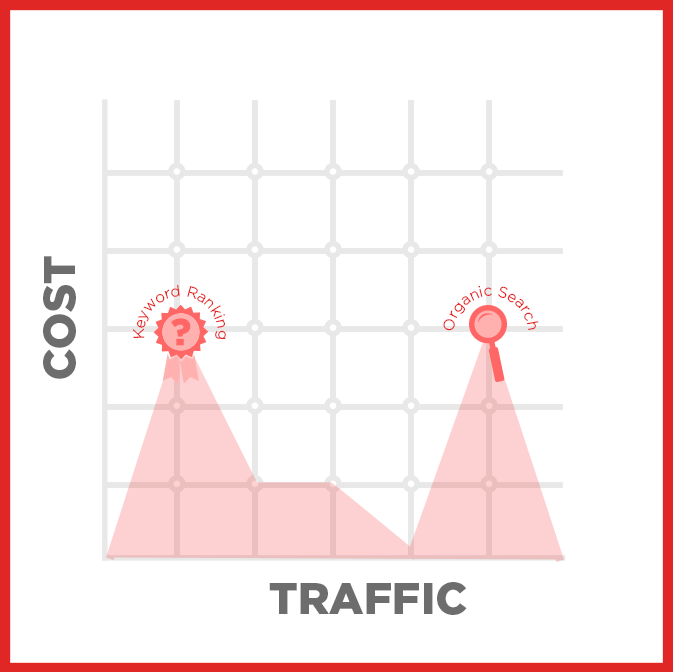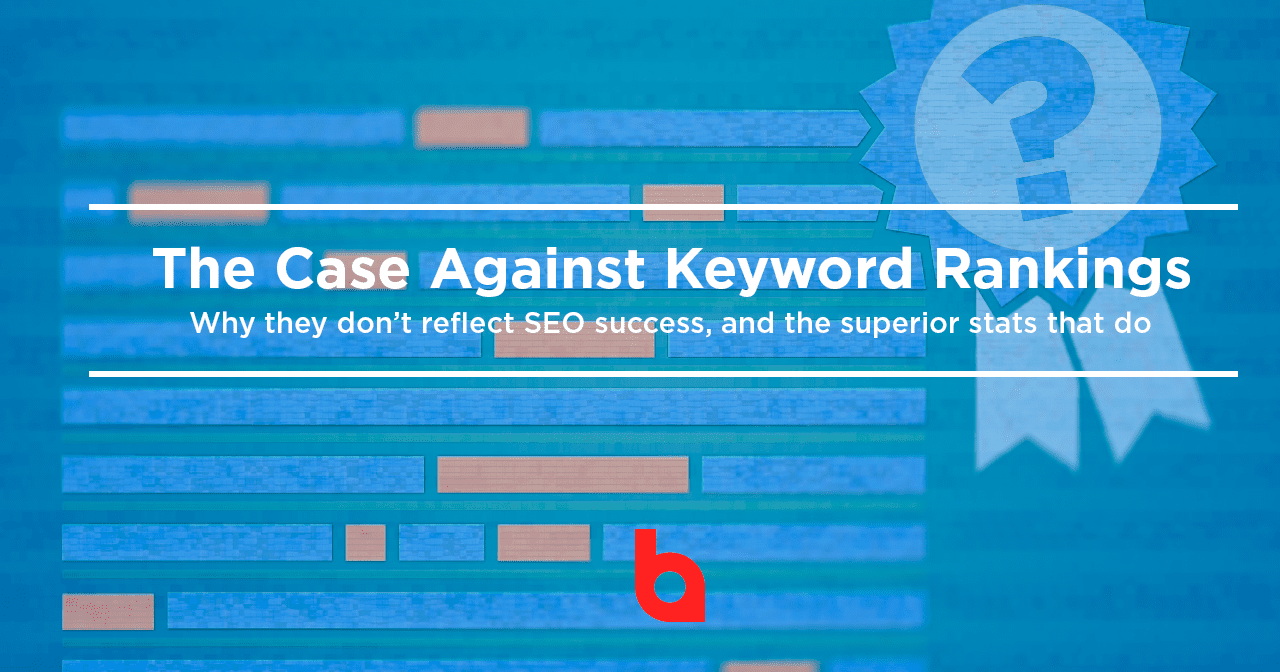Get out the shovel and your funeral attire. Let’s put keyword rankings reports down to rest forever. Clients famously love to ask, “Why am I [not] ranking on page [insert arbitrary page number] in Google for [insert arbitrary keyword phrase]?” – without realizing the flawed methodology in their cursory self-audit. When I was a consultant, the number of times I had to explain to clients why keyword rankings aren’t really important would have suggested that my job title should have been crisis manager. Here, we’ll examine why individual keyword rank is largely an unreliable, un-actionable metric, and investigate some superior statistics to use instead.
SEOs have always used keyword rankings reports, and clients have always wanted them. But, have we ever stopped to ask “why?” Thankfully, Google’s ranking algorithm updates over the past few years have sparked this question, along with more curiosity about whether or not keyword rankings reports are actually useful. Furthermore, agencies have begun dropping these reports, though the recent shift in philosophy can also be attributed to the simple fact that rankings reports have always inherently had shortcomings.
Keyword Rankings Are Meaningless
We know that the world of SEO is not a place for speaking in absolutes, yet I would argue that per se keyword rankings are meaningless. Whether or not your site ranks on the first page of Google’s SERPs (search engine results pages) for “blue widgets” – and 20 related keywords, for that matter – may not affect your traffic and subsequent conversions at all. Where traffic and conversions (sales/revenue in an e-commerce setting) are the signals, keyword rankings are the noise.
I know the feeling. You’ve compiled a long list of “money” / “golden” / “long-tail” / “focus” keywords (SEOs like to use nouns as weird adjectives), you’ve uploaded them to your nifty rank tracking tool, and within a few months of optimizing your content for your new keywords, you’ve actually seen some decent rank improvement and your site is on the first page of the SERPs for some of them. Woohoo! Proud and satisfied, you open up your Google Analytics dashboard with a huge smile on your face to see the sweet fruit of your labor, only to have that smile turned upside down when you realize not one of those keywords has brought in a single visitor.
Intuitively, it makes sense. What good is a #1 ranking for a particular keyword if it in no way contributes to your website’s traffic and conversions? The best way to start this conversation is with an illustrative example: The Brandon Agency’s own website ranks all over the first page of the Google SERPs for the long-tail keyword phrase “accredited brand strategy agency south carolina,” yet it should be obvious that no one is searching for this term. (We call this having zero search volume.) We are not getting any traffic from it, and we likely never will get any traffic from it. Showing a client an example like this is a good way to get them to begin understanding why their arbitrarily-thought-up keywords, and the rankings thereof, are usually of zero importance.
Keyword Rankings Are Unreliable
Not only are keyword rankings useless, they are also unreliable. Things like history-based personalized search, location, device type, CTR and auto-suggested searches, all of which influence and dynamically change a user’s search results, make keyword rankings extremely volatile and impossible to accurately derive. Those things combined with the fact that different tools use different rank-tracking methodologies mean you will never know the true rank for a particular keyword anyway, rendering any sort of comparison (even a comparison to competitors’ rankings) or meaningful interpretation impossible.
Moreover, Google’s ranking algorithm – called Hummingbird – now contains hundreds of different factors. Speculation on the cause of any sort of rank change is just that and can be likened to attempting to explain why an individual stock’s value will rise or fall in the immediate future.
Alternative, Superior Metrics to Use
If clients insist on seeing keyword rankings reports, I’ll oblige, but not without attempting to educate them on why they don’t mean much and giving them a huge grain of salt to take with them. This seeming obsession over keyword rankings is largely a philosophical and educational problem: “SEO” and “keyword rankings” unfortunately seem to be – and have historically been – inextricably linked in clients’ and even agencies’ minds. It is the job of SEOs to compensate for this phenomenon by explaining its futility and by introducing superior stats to use instead of keyword rankings. Simply telling clients ad nauseam that rankings don’t matter isn’t enough; SEOs must strive to offer alternative solutions that are more meaningful, impactful and actionable. So, let’s unpack those:
- Organic Search Traffic Minus Brand Name – The first of our alternative metrics, this one looks at traffic from search queries (keywords that are actually bringing traffic to your website are specifically called “search queries”) that don’t include the brand’s name. This aggregates all non-branded keywords and provides a single number to track that will hopefully increase, meaning your SEO efforts are expanding the “reach” of your organic SERP listings.
Specifically, for this metric to rise in value, your website would be ranking higher for existing search queries and/or your website would be showing up in the SERPs for more search queries. To get this metric, pull your organic search query traffic data from Search Console and sum up the clicks from queries that don’t include the brand name. The reason we don’t include branded searches here, of course, is that the brand will almost always rank #1 for a query containing its own name, and brand awareness is usually driven by other channels like social media, PR and email marketing. Note that this metric can be very useful internally but still does not provide much insight for the client in an external report.
- Keyword Groups – Building upon the metric above, you can segment those non-branded search queries into content-specific groupings. For example, if you sell shirts on your website, you could have keyword groups for different types of shirts – button-downs, polos, T-shirts, etc. – and track the change in traffic by group. Drill down as much or as little as you want, and this will give you an idea of which content groups are the most popular and which ones need some work. You may already have these groupings based on your PPC ad groups or campaigns.
- Organic Search Traffic by Landing Page – Continuing on the shirts example, if your category page for button-downs has many different button-down-related search queries that bring in traffic, simply track the number of visitors landing on that page from organic search.
- Conversions from Organic Search – While you can’t get reliable data for conversions at the search query level, we can look at conversions that originated from organic search in Google Analytics. You can also compare conversion rate across channels, and conversions and conversion rate by landing page.
- Revenue, Average Order Value, and Revenue Per Visitor – Specifically for e-commerce, some important metrics to look at are obviously revenue, average order value and revenue per visitor. You can segment these by channel and look at how the organic search channel’s contribution compares to that of other channels, and you can also drill down on these to specific landing pages. Moreover, other oft-forgotten aspects of SEO are intrinsically intertwined with the above metrics: page load speed, user experience, content organization, etc., all of which obviously affect conversions, but all of which also happen to affect rankings.
 SEO campaigns and the success or failure thereof need to be measured by traffic and conversions, not keyword rankings. Using per se rankings as an actual KPI is dead. An unfortunate lack of understanding of this simple concept has led many to view SEO as snake oil (think of all the spam emails you get promising #1 rankings) and has incidentally resulted in a lot of headache for SEOs from clients that could have been avoided with the proper education. Tracking actual traffic-generating search queries and their resulting conversions will yield much more significant, actionable data than keyword rankings.
SEO campaigns and the success or failure thereof need to be measured by traffic and conversions, not keyword rankings. Using per se rankings as an actual KPI is dead. An unfortunate lack of understanding of this simple concept has led many to view SEO as snake oil (think of all the spam emails you get promising #1 rankings) and has incidentally resulted in a lot of headache for SEOs from clients that could have been avoided with the proper education. Tracking actual traffic-generating search queries and their resulting conversions will yield much more significant, actionable data than keyword rankings.
To see what search queries you’re getting traffic for and how to design your content strategy around them to optimize for conversions, contact us today, or find us on Facebook, Twitter, Instagram and LinkedIn.
